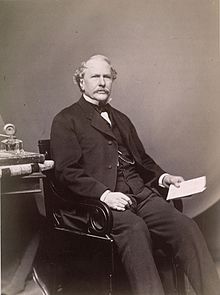A.S. Abell
| Arunah Shepherdson Abell | |
|---|---|

1871 photograph
|
|
| Born |
August 10, 1806 East Providence, Rhode Island, United States |
| Died | April 19, 1888 (aged 81) Baltimore, Maryland, U.S.A. |
| Occupation | Newspaper publisher, philanthropist |
| Known for | Founder of the "The Sun" of Baltimore and the "Philadelphia Public Ledger" |
| Children | 3 sons |
| Signature | |
Arunah Shepherdson Abell (August 10, 1806 – April 19, 1888) was an American publisher and philanthropist from New England who was active in Pennsylvania and Maryland. Born in East Providence, Rhode Island, Abell learned the newspaper business as an apprentice at the Providence Patriot. After stints with newspapers in Boston and New York City, he co-founded the Public Ledger in Philadelphia and later independently founded the The Sun of Baltimore, Maryland; both were penny papers to appeal to the working class. Abell and his descendants continued ownership of The Sun as a family business until 1910.
Abell is noted as an innovative publisher in the newspaper business, making use of new systems and technology: pony express delivery of news from New Orleans, using the telegraph to transmit news from the first Mexican-American War and a President's speech to the Congress in Washington, D.C., and using the new rotary/cylinder printing press invented by Richard March Hoe.
Abell was born in East Providence, Rhode Island on August 10, 1806 to parents of generations of English ancestry. After leaving school at the age of 14, he worked as a clerk in a retail business specializing in West Indian wares, before he became an apprentice at the Providence Patriot newspaper in 1822. He served as a journeyman printer in Boston and New York City.
In New York, he met two other young newspapermen, Azariah H. Simmons and William Moseley Swain (1809–1868), and they became friends. Together, they decided to go into business and found a "penny paper". At the time, the majority of newspapers were associated with a political party or with business interests. For example, Abell's newspaper in Baltimore was strongly associated with the Democratic Party; Abell was offered a political appointment as a result of his work on it. Penny papers were a relatively new phenomenon at the time. Originating in England, they made newspapers accessible to the working classd, since previous papers were too expensive for many consumers. As New York already had a number of penny papers, Abell, Simmons, and Swain founded their paper in Philadelphia where there was less competition, starting Public Ledger in 1836. Within 2 years, the Public Ledger absorbed its nearest rival, the Philadelphia Transcript. Under Abell, the Ledger continued to appeal to the working class as a penny paper; he concentrated on sensationalist stories and scandals.
...
Wikipedia
